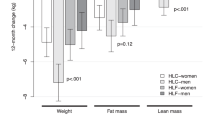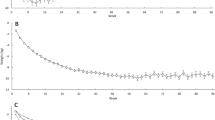Abstract
Background:
Dietary adherence has been implicated as an important factor in the success of dieting strategies; however, studies assessing and investigating its association with weight loss success are scarce.
Objective:
We aimed to document the level of dietary adherence using measured diet data and to examine its association with weight loss success.
Design:
Secondary analysis was performed using data from 181 free-living overweight/obese women (mean±s.d. age=43±5 years, body mass index=31±4 kg m−2) participating in a 1-year randomized clinical trial (the A TO Z study) comparing popular weight loss diets (Atkins, Zone and Ornish). Participants' dietary adherence was assessed as the difference between their respective assigned diet's recommended macronutrient goals and their self-reported intake. Association between dietary adherence and 12-month weight change was computed using Spearman's correlations. Differences in baseline characteristics and macronutrient intake between the most and least adherent tertiles for diet groups were compared using t-tests.
Results:
Within each diet group, adherence score was significantly correlated with 12-month weight change (Atkins, rs=0.42, P=0.0003; Zone, rs=0.34, P=0.009 and Ornish, rs=0.38, P=0.004). Twelve-month weight change in the most vs least adherent tertiles, respectively, was −8.3±5.6 vs −1.9±5.8 kg, P=0.0006 (Atkins); −3.7±6.3 vs −0.4±6.8 kg, P=0.12 (Zone) and −6.5±6.8 vs −1.7±7.9 kg, P=0.06 (Ornish).
Conclusions:
Regardless of assigned diet groups, 12-month weight change was greater in the most adherent compared to the least adherent tertiles. These results suggest that strategies to increase adherence may deserve more emphasis than the specific macronutrient composition of the weight loss diet itself in supporting successful weight loss.
This is a preview of subscription content, access via your institution
Access options
Subscribe to this journal
Receive 12 print issues and online access
$259.00 per year
only $21.58 per issue
Buy this article
- Purchase on Springer Link
- Instant access to full article PDF
Prices may be subject to local taxes which are calculated during checkout

Similar content being viewed by others
References
Bish CL, Blanck HM, Serdula MK, Marcus M, Kohl III HW, Khan LK . Diet and physical activity behaviors among Americans trying to lose weight: 2000 Behavioral Risk Factor Surveillance System. Obes Res 2005; 13: 596–607.
Thom T, Haase N, Rosamond W, Howard VJ, Rumsfeld J, Manolio T et al. Heart disease and stroke statistics—2006 Update: a report from the American Heart Association Statistics Committee and Stroke Statistics Subcommittee. Circulation 2006; 113: e85–151.
Crawford D, Jeffery RW, French SA . Can anyone successfully control their weight? Findings of a three year community-based study of men and women. Int J Obes Relat Metab Disord 2000; 24: 1107–1110.
Serdula MK, Mokdad AH, Williamson DF, Galuska DA, Mendlein JM, Heath GW . Prevalence of attempting weight loss and strategies for controlling weight. JAMA 1999; 282: 1353–1358.
Diabetes Prevention Program Research Group. Reduction in the incidence of type 2 diabetes with lifestyle intervention or metformin. N Engl J Med 2002; 346: 393–403.
Leon A, Sanchez O . Response of blood lipids to exercise training alone or combined with dietary intervention. Med Sci Sports Exerc 2001; 33: S502–S515.
Tchernof A, Nolan A, Sites CK, Ades PA, Poehlman ET . Weight loss reduces C-reactive protein levels in obese postmenopausal women. Circulation 2002; 105: 564–569.
Stevens VJ, Obarzanek E, Cook NR, Lee IM, Appel LJ, Smith West D et al. Long-term weight loss and changes in blood pressure: results of the trials of hypertension prevention, phase II. Ann Inter Med 2001; 134: 1–11.
Gardner CD, Kiazand A, Alhassan S, Kim S, Stafford RS, Balise RR et al. Comparison of the Atkins, Zone, Ornish, and LEARN diets for change in weight and related risk factors among overweight premenopausal women. The A TO Z Weight Loss Study: a randomized trial. JAMA 2007; 297: 969–977.
Dansinger ML, Gleason JA, Griffith JL, Selker HP, Schaefer EJ . Comparison of the Atkins, Ornish, Weight Watchers, and Zone diets for weight loss and heart disease risk reduction: a randomized trial. JAMA 2005; 293: 43–53.
Brehm BJ, Seeley RJ, Daniels SR, D′Alessio DA . A randomized trial comparing a very low carbohydrate diet and a calorie-restricted low fat diet on body weight and cardiovascular risk factors in healthy women. J Clin Endocrinol Metab 2003; 88: 1617–1623.
Foster GD, Wyatt HR, Hill JO, McGuckin BG, Brill C, Mohammed BS et al. A randomized trial of a low-carbohydrate diet for obesity. N Engl J Med 2003; 348: 2082–2090.
Stern L, Iqbal N, Seshadri P, Chicano KL, Daily DA, McGrory J et al. The effects of low-carbohydrate versus conventional weight loss diets in severely obese adults: one-year follow-up of a randomized trial. Ann Inter Med 2004; 140: 778–785.
Heymsfield SB, Harp JB, Reitman ML, Beetsch JW, Schoeller DA, Erondu N et al. Why do obese patients not lose more weight when treated with low-calorie diets? A mechanistic perspective. Am J Clin Nutr 2007; 85: 346–354.
Knauper B, Cheema S, Rabiau M, Borten O . Self-set dieting rules: adherence and prediction of weight loss success. Appetite 2005; 44: 283–288.
Westman EC, Yancy WS, Edman JS, Tomlin KF, Perkins CE . Effect of 6-month adherence to a very low carbohydrate diet program. Am J Med 2002; 113: 30.
Heshka S, Anderson JW, Atkinson RL, Greenway FL, Hill JO, Phinney SD et al. Weight loss with self-help compared with a structured commercial program: a randomized trial. JAMA 2003; 289: 1792–1798.
Atkins R . Dr. Atkins' New Diet Revolution. Harper Collins: New York, 2002.
Sears B, Lawren W . Enter The Zone: A Dietary Road Map to Lose Weight Permanently: Reset Your Genetic Code: Prevent Disease: Achieve Maximum Physical Performance. Harper Collins: New York, 1995.
Ornish D . Eat More Weigh Less. Harper Collins: New York, 2001.
Brownell K . The LEARN Program for Weight Management 10th edn. American Health Publishing Company: Dallas, 2000.
Rencher AC . Characterizing and displaying multivariate data. Methods of Multivariate Analysis vol. 2. John Wiley: Hoboken, NJ, 2002. pp 43–81.
Weber JL, Reid PM, Greaves KA, DeLany JP, Stanford VA, Going SB et al. Validity of self-reported energy intake in lean and obese young women, using two nutrient databases, compared with total energy expenditure assessed by doubly labeled water. Eur J Clin Nutr 2001; 55: 940–950.
Golay A, Allaz AF, Morel Y, de Tonnac N, Tankova S, Reaven G . Similar weight loss with low- or high-carbohydrate diets. Am J Clin Nutr 1996; 63: 174–178.
Leibel RL, Hirsch J, Appel BE, Checani GC . Energy intake required to maintain body weight is not affected by wide variation in diet composition. Am J Clin Nutr 1992; 55: 350–355.
Rumpler WV, Seale JL, Miles CW, Bodwell CE . Energy-intake restriction and diet-composition effects on energy expenditure in men. Am J Clin Nutr 1991; 53: 430–436.
Yang MU, Van Itallie TB . Composition of weight lost during short-term weight reduction. Metabolic responses of obese subjects to starvation and low-calorie ketogenic and nonketogenic diets. J Clin Invest 1976; 58: 722–730.
Acknowledgements
This investigation was supported by NIH grant R21 AT001098, by a grant from the Community Foundation of Southeastern Michigan, and by Human Health Service grant M01-RR00070, General Clinical Research Centers, National Center for Research Resources and National Institutes of Health. Dr Gardner received a pilot grant from the Robert C Atkins Foundation in 2007 after the conclusion of the A TO Z weight loss study. None of the other authors had a personal or financial conflict of interest.
Author information
Authors and Affiliations
Corresponding author
Rights and permissions
About this article
Cite this article
Alhassan, S., Kim, S., Bersamin, A. et al. Dietary adherence and weight loss success among overweight women: results from the A TO Z weight loss study. Int J Obes 32, 985–991 (2008). https://doi.org/10.1038/ijo.2008.8
Received:
Revised:
Accepted:
Published:
Issue Date:
DOI: https://doi.org/10.1038/ijo.2008.8
Keywords
This article is cited by
-
Impacts of food consumption on biochemical markers and anthropometric variables of women with metabolic syndrome
BMC Women's Health (2022)
-
A Proposed Conceptual Sport Nutrition Approach for Athlete Development and Assessment: The Athlete Nutrition Development Approach
Sports Medicine - Open (2022)
-
Restricted cafeteria feeding and treadmill exercise improved body composition, metabolic profile and exploratory behavior in obese male rats
Scientific Reports (2022)
-
Problem-solving, Adherence to Lifestyle Goals, and Weight Loss Among Individuals Participating in a Weight Loss Study
International Journal of Behavioral Medicine (2021)
-
Determinants favoring weight regain after weight-loss therapy among postmenopausal women
Scientific Reports (2020)



